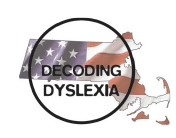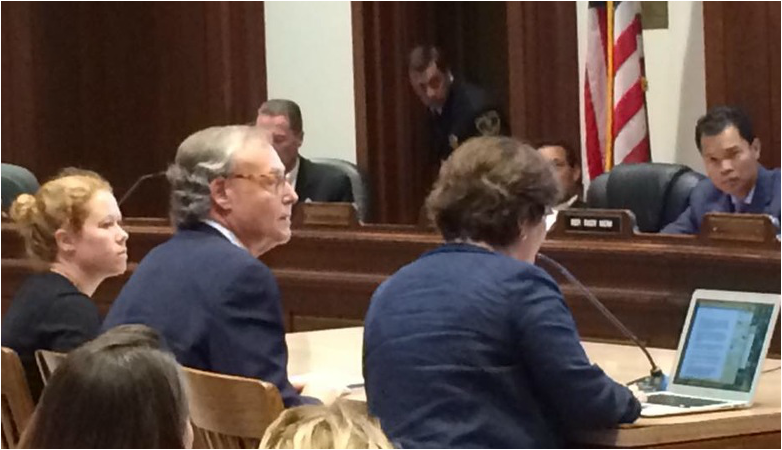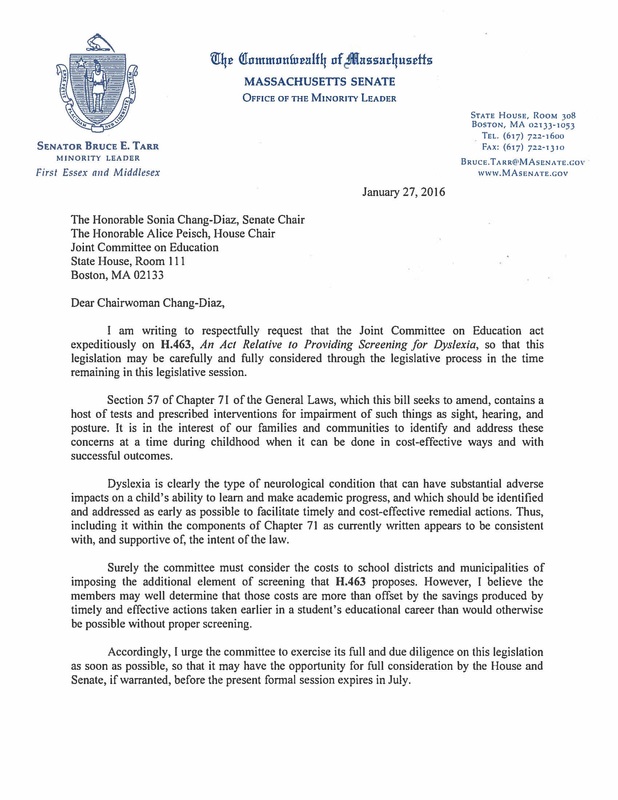Dyslexia Legislation Ensures Civil Rights
See our pages on IDEA and 504 under the Civil Rights drop down menu
Dyslexia Legislation is a civil rights issue.
- Early screening is consistent with Massachusetts Section 57 Chapter 71 of the General Laws. Dyslexia can be validly and efficiently screened like for example, vision or hearing, in schools.
- Current practice varies from district to district. Legislation will ensure reference to scientific, legitimate and consistent information. Lack of Dyslexia Legislation is the basis of poor policies and regulations with respect to the civil rights of students born with dyslexia.
- Some Massachusetts schools refuse to use the word dyslexia despite IDEA and federal guidelines that include "dyslexia" specifically. Due process and civil rights court proceeding are a costly and slow process that are currently the only way to ensure these rights. Testimony during the June Hearing for Dyslexia Legislation and submitted subsequently by families across the Commonwealth document the high number of schools refusing to recognize dyslexia based on the scientific definition and with evidenced based intervention. Students who can not afford to navigate this legal appeal process go without services.
- Some schools have outdated misconceptions about what dyslexia is, when and how it can be identified and what are the evidenced based practices for dyslexia are "best practices". Again slow and expensive Due Process or court proceedings would be avoided if with legislation that protects the civil rights of dyslexic students by acknowledging the science based definition and early screening. Screening would ensure that parents and teachers had scientific and valid information about dyslexia equally and not only to those who hire private evaluators, advocates and attorneys.
- As a state Massachusetts collects no data on dyslexia and only refers to Specific Learning Disability (SLD) a category that is too broad and can be an "impediment to effective instruction". (Note this is from the Review of Special Education in the Commonwealth, Report commissioned by Massachusetts Department of Elementary and Secondary Education on April 2012) http://www.decodingdyslexiama.org/ma-sld-facts.html
Disability Advocates and Civil Rights advocates across this country recognize the need for legislative change.
Being born with a neurobiological difference (brain differences in structure and organization) is legally no different than being born with other differences that require acknowledgement to guarantee civil rights
Hidden disabilities can not be seen, but are no less disabling, The NAACP has issued a Resolution on Dyslexia shared by Decoding Dyslexia Nebraska. Link to Resolution
Dyslexia advocates have organized and created Decoding Dyslexia state and local groups and a national network of leaders to address the civil rights of students with dyslexia across the US and in Canada.
Learn more about their efforts: Link to Article
Massachusetts students with dyslexia will remain subject to the variable and subjective mis-identification and lack of evidenced based instructions guided by scientific understanding knowledge of dyslexia without legislations.
Massachusetts Section 57 Chapter 71 of the General Laws contains a host of tests and interventions for impairments of things such as vision, hearing and posture. Dyslexia is impacts learning and it is consistent with and supportive of the intent of this law. Excluding students with dyslexia from early screening while affording this right to others is discriminating against these students who deserve the benefits of early screening provided by this legislation. See the current law that excludes students with dyslexia from early screening. https://malegislature.gov/Laws/GeneralLaws/PartI/TitleXII/Chapter71/Section57The following Letters of Support have been submitted by concerned legislators:
Hidden disabilities can not be seen, but are no less disabling, The NAACP has issued a Resolution on Dyslexia shared by Decoding Dyslexia Nebraska. Link to Resolution
Dyslexia advocates have organized and created Decoding Dyslexia state and local groups and a national network of leaders to address the civil rights of students with dyslexia across the US and in Canada.
Learn more about their efforts: Link to Article
Massachusetts students with dyslexia will remain subject to the variable and subjective mis-identification and lack of evidenced based instructions guided by scientific understanding knowledge of dyslexia without legislations.
Massachusetts Section 57 Chapter 71 of the General Laws contains a host of tests and interventions for impairments of things such as vision, hearing and posture. Dyslexia is impacts learning and it is consistent with and supportive of the intent of this law. Excluding students with dyslexia from early screening while affording this right to others is discriminating against these students who deserve the benefits of early screening provided by this legislation. See the current law that excludes students with dyslexia from early screening. https://malegislature.gov/Laws/GeneralLaws/PartI/TitleXII/Chapter71/Section57The following Letters of Support have been submitted by concerned legislators:
Senator Jason Lewis Letter of Support
Senator Bruce Tarr Letter of Support |
Senator Jason Lewis Letter of Support
Senator James Eldridge Letter of Support
Senator John F. Keenan Letter of Support
Representative Louis L. Kafta Letter of Support
Representative Jennifer E. Benson Letter of Support
Representative James J. Lyons Letter of Support
Representative James M. Cantwell Letter of Support
Representative Chris Walsh Letter of Support
Representative William Galvin Letter of Support
Senator William Brownsberger
Representative Josh Cutler
| ||||||||||||||||||||||


